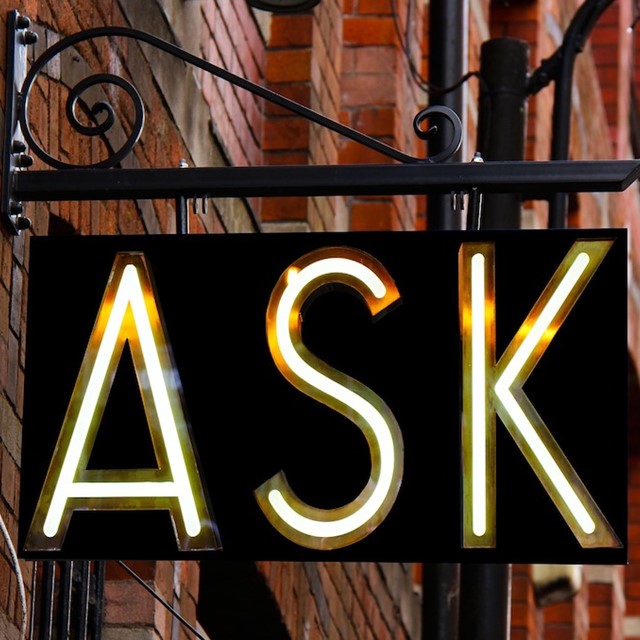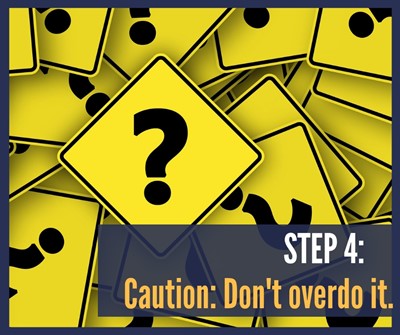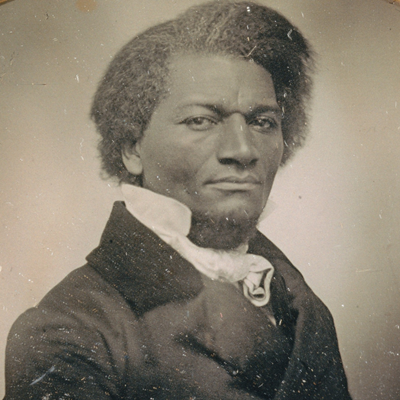
Sometimes we ask questions, because we’re looking for information. We want a direct answer:
"What’s for dinner?"
"Meatloaf."
A rhetorical question is one a speaker asks, not looking for information, but to set up her own response:
"What’s happened to dinner time in America? What does that mean for our health?"
As you see, a rhetorical question can open up a topic, challenge you to examine new ideas, or re-examine old ones.
Almost every speaker will use a rhetorical question at some point in a presentation. Let’s make sure you’re doing it for maximum impact.

Step 1. Know why you’re using a rhetorical question.
There are a variety of reasons you might ask a rhetorical question:
- To get a laugh
- To get agreement
- To challenge an idea or show it to be absurd
But most speakers we work with use rhetorical questions for a different purpose: Whether they realize it or not, they’re trying to shift the audience from passive receiver to active participant.
When speakers ask rhetorical questions for this purpose, they’re asking you to stop sitting there like a lump. They want to engage your mind, get you to consider what you think before they provide the answer.

Step 2. Come up with a decent question.
If engaging the audience is your purpose, how you frame the question is important.
Consider an open-ended question instead of a yes/no.
For example, is you present a business problem in a presentation, you’ll find that "What should we do next?" will get the audience thinking more than "Should we move forward?"
Rethink using questions with obvious answers.
Speakers seeking to appeal to audience interest will ask questions such as "Do you want to make more money?" We wonder who they expect to say "no." These questions encourage the skeptics in the audience to roll their eyes and make the speaker seem less than genuine or out of touch. Questions with obvious answers don’t inspire thought but do risk annoying.
Keep the question short—and avoid answering the question in the process of asking it.
For example, instead of asking "What should we do if we believe our mothers, wives, sisters, daughters, aunts, grandmothers and other female friends and acquaintances are equal, deserve equal opportunity, and deserve equal pay?" go with something simple: "What should we do if we believe women are equal?"

Step 3. Pause after you ask it.
If you’re asking a rhetorical question to provoke thought, don’t blow this next critical step: Pause for a beat, let the question sink in, give the audience a chance to ponder it and answer it for themselves.
Then, provide your answer.
When you rush to answer a rhetorical question, you're undermining the very effect you hope to achieve--engagement.
And you’re disrespecting the audience: "I asked you to consider this, but I’m just using a cheap rhetorical trick to get you more involved in my presentation. Let's get on to the important point--what I think!"
Every presentation needs variety to hold audience attention—and a rhetorical question is a great way to bring variety in more ways than one. You 1) make the audience active and 2) vary your delivery rate and timing when you pause after posing the question.

Step 4. Don’t overdo.
If a rhetorical question can mix things up and bring some much-needed variation to your delivery, it’s important not to abuse the device.
Because when you start to pepper the audience with questions and go overboard, the rhetorical question loses its oomph. We love this passage we found on a writing blog that illustrates just what we mean:
Do rhetorical questions add value to your content? Or are you doubting yourself about them? Do you not feel like the question belongs? Are you writing a piece where the rhetorical question would sound really odd? Are you being repetitious with them to pad out the word count rather than adding information to your piece? Are you coming off as degrading or terse, repeating the same information or obvious information in a new way to make it sound like you’re saying something entirely new?
Or rather, are you trying to be overly conversational in a way that actually is off-putting to a reader? Do you feel like you’re pestering your reader with questions like an interviewer or a car salesman who assumes they know their audience intimately, when they really don’t? Are you trying to be cute and colloquial — and failing?
Am I making my point yet?






